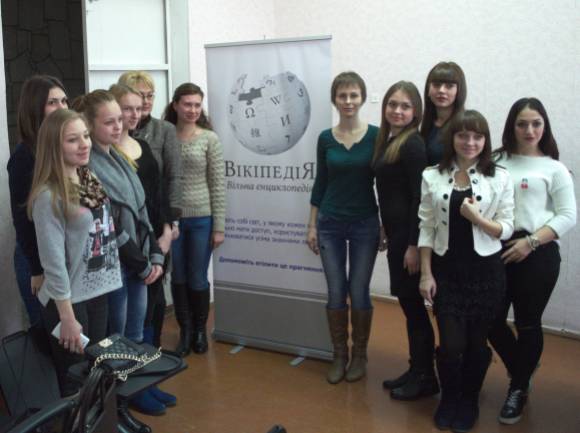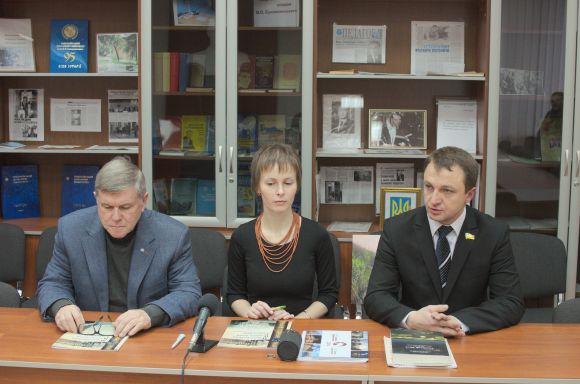
Wikitraining in Mykolaiv National University. Image by Illia Korniiko, freely licensed under CC-BY-SA-4.0.
Being wholly committed to Wikipedia, we in Wikimedia Ukraine have no doubt that Wikipedia belongs in education—the more educators and authorities who know this the better. This month, a significant step forward was made in the expansion of the Wikipedia Education Program in Ukraine, as we welcomed a whole new region into the Education Program: Mykolaiv Oblast.
The story began, not uncommonly, when one lecturer in the Vasyl Sukhomlynskyi National University of Mykolaiv learned about the “Edit” button on Wikipedia articles and decided to share this with his students. Using the Education Program extension for MediaWiki, Taras Kremin, a docent (or assistant professor) in the Faculty of Philology, created the course “Culture of the South. 100 Literary Biographies“. One hundred articles about the writers, poets, historians, specialists in study of literature, and of Mykolaiv Oblast are to be created or improved during this course by 30 students.
Taras Kremin got in contact with Wikimedia Ukraine to help with training students to edit and format Wikipedia pages. On December 12th and 13th, several experienced Wikipedians held a Wikitraining event for these students. Afterwards, students said that they had either no idea that anyone can edit Wikipedia or considered that it was too difficult for them to do. Of course, a two-day training event, though rather extensive, is not enough to learn everything. However, after that training, students had faith in themselves as editors.
As Taras Kremin is also a Member of Parliament of Ukraine, he brought this idea with him to other authorities. People writing Wikipedia are contributing important content that Ukrainian media is not so rich with. Mykolaiv State Region Administration expressed its readiness to spread the word about Wikipedia to other institutions. So on the same day, a memorandum of cooperation between Wikimedia Ukraine and Mykolaiv State Region Administration was signed as well.
Oksana Yanishevska, Deputy Chair of Mykolaiv State Region Administration, had underlined that state region administration cooperated with Wikimedia—and not for first time. Back in 2013, they ran an article contest under the title “Mykolaiv Spring in Wikipedia” that resulted in 250 Wikipedia articles about famous sites and citizens of Mykolaiv Oblast. Today we still don’t have full lists of monuments of architecture in Mykolaiv Oblast needed for a Wiki Loves Monuments contest, but, hopefully, this will change soon; on one occasion Wikimedia Ukraine was even forced to file a lawsuit to get one such list. Taras Kremin is also acting as co-author of the draft law which will bring freedom of panorama to Ukraine when passed.
The Wikipedia Education Program in Ukraine is mainly about replacing ordinary student papers with Wikipedia articles. Such papers have the same topic year after year. So even if writing them is useful somehow for a student, it is certainly not useful for the educators or the public. On the other hand, Wikipedia articles need be created only once, but can be read by anyone on the web and are improved constantly by other editors. Educators in the Vasyl Sukhomlynskyi National University of Mykolaiv understand this and other advantages of working with Wikipedia, and they expressed their willingness to continue working with this new education model. On December 14th, representatives of Wikimedia Ukraine and the Vasyl Sukhomlynskyi National University of Mykolaiv signed the memorandum of cooperation.
The first event within this collaboration will be a training for tutors planned for February 2016. The organization of this training was discussed with Vasyl Shuliar, Director of the Mykolaiv Oblast institute of post-graduate education for teachers. The Wikipedia Education Program cannot be realized without teachers getting involved in editing Wikipedia, and Wikimedia Ukraine plans to provide as much training events as possible.
| “ | Up until 1989, Mykolaiv was a closed city of shipbuilders with military-industrial enterprises. No foreigners were allowed here and the city wasn’t on a map even though it had 500 thousand citizens. This is a reason why Mykolaiv is poorly known in the world and in Ukraine. And its high time to complete this gap. Joint efforts on the article contest “Mykolaiv Spring in Wikipedia” led to the addition of new information about the city and the region in Wikipedia. I hope that such a collaboration will open us to the world. The education process is also going to become more innovate and fruitful for the country in general as information published will be available for everyone. We have so many worthy things to share. And we have much to be proud of. | ” |
|
— Taras Kremin |
||
Wikimedia Ukraine would be happy to see a rich collaboration with this region, and a lot of already ongoing projects and ideas can be implemented here. We plan to work with Wikipedia Education Program, organize regional events for Wikipedians from all over the southern part of Ukraine etc. Placing QR-codes on the monuments of the city will mean motivation for writing articles about them in Ukrainian, English, and other languages. Mykolaiv Oblast is an attractive territory for tourists. There are many places worth covering by Wiki Loves Earth and Wiki Loves Monuments photo contests, and we plan to initiate some preparatory work and engage students of photo schools. GLAM can be raised to a new level in the wonderful museums of Mykolayiv and the surrounding region, like the Mykolayiv Regional Museum of Local History , The Museum of Shipbuilding and Fleet, and others. We also considering holding Summer Wikischool for high school students, similar to Wikicamp in Armenia. Wikipedia belongs in education and now it is in Mykolaiv Oblast.
Vira Motorko, Wikimedia Ukraine

Valerii Budak, Mykolaiv National University rector (chancellor), Nataliia Tymkiv, ED of WMUA, and Taras Kremin, Member of Parliament of Ukraine. Image by Illia Korniiko, freely licensed under CC-BY-SA-4.0.
In brief

Can you help us translate this article?
In order for this article to reach as many people as possible we would like your help. Can you translate this article to get the message out?
Start translation